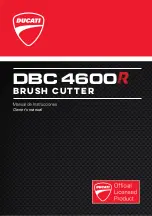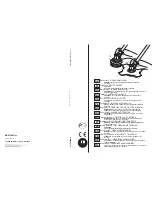
GB-8
BK3420FL-EZ
5. For safe operation
you understand what causes
blade thrust, how you can reduce
the chance of blade thrust and
how you can remain in control of
the unit if blade thrust does oc-
cur.
1. What causes blade thrust:
Blade thrust can occur when the
moving blade contacts an object
that it cannot cut. This contact
causes the blade to stop for an in-
stant and then suddenly move or
”bounce” away from the object that
was hit. The operator can lose con-
trol of the unit and the blade can
cause serious personal injury to the
operator or any person nearby if the
blade contacts any part of the
body.
2. How you can reduce the chance
of blade thrust:
(1) Recognize that blade thrust can
happen. By understanding and
knowing about bounce, you can
help eliminate the element of
surprise.
(2) Cut fibrous weeds and grass
only. Do not let the blade contact
materials it cannot cut such as
hard, woody vines and brush or
rocks, fences, metal, etc
(3) Be extra prepared for blade
thrust if you must cut where you
cannot see the blade making
contact such as in areas of
dense growth.
(4) Keep the blade sharp. A dull
blade increase the chance of
blade thrust.
(5) Avoid feeding the blade too
rapidly. The blade can bounce
away from material being cut if
the blade is fed faster than its
cutting capability.
(6) Cut only from your right to your
left.
(7) Keep your path of advance clear
of material that has been cut
and other debris.
3. How you can maintain the best
control:
(1) Keep a good, firm grip on the
unit with both hands. A firm grip
can help neutralize bounce.
Keep your right and left hands
completely around the respec-
tive handles.
(2) Keep both feet spread apart in
a comfortable stance and yet
braced for the possibility that
the unit could bounce. Do not
overreach. Keep firm footing
and balance.
01-BK3420FL-EZ_GB_207_三.indd 8
12.9.21 1:24:13 PM








































